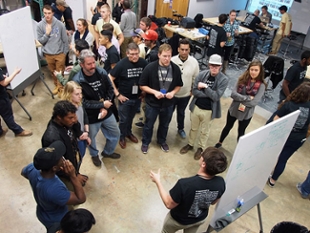How Innovation Fellows are boosting JMU's national profile
NewsSUMMARY: The University Innovation Fellows program strives to empower students to become leaders of change in higher education. The program is run by the National Science Foundation-funded Epicenter, which is directed by Stanford University and the nonprofit, VentureWell. To become a fellow, students have to complete a week of training at Stanford and then conduct programs at their home institutions. Ashley is part of JMU's second cohort of Innovation Fellows.
 Chris Ashley says he doesn't have any qualms about giving up part of his upcoming spring break to attend a conference in Austin, Texas.
Chris Ashley says he doesn't have any qualms about giving up part of his upcoming spring break to attend a conference in Austin, Texas.
"It's easily worth it," said the junior economics major who will spend March 8 participating in a session of the South-by-Southwest-edu Conference (SXSWedu). "It's a great opportunity and I don't know if it will come back around." Ashley will be part of a University Innovation Fellows team that will discuss ways students can influence the direction of their universities.
The University Innovation Fellows program strives to empower students to become leaders of change in higher education. The program is run by the National Science Foundation-funded Epicenter, which is directed by Stanford University and the nonprofit, VentureWell. To become a fellow, students have to complete a week of training at Stanford and then conduct programs at their home institutions. Ashley is part of JMU's second cohort of Innovation Fellows.
The SXSWedu conference is the first of two national meetings Ashley will participate in. The second will be March 17-20 at Stanford University, where JMU's Innovation Fellows will have a leading role in workshops and other activities for a new class of University Innovation Fellows from universities across the country. Altogether, there are 607 fellows at 143 universities.
At SXSWedu, Ashley said the presentation will feature "ignite-style" conversations that engage the audience. "It's not something where you're going to go and sit down and be quiet for 90 minutes," he said. The group will discuss the importance of empowering students to help enhance an innovative and entrepreneurial ecosystem at their universities.
"A lot of change at an institution comes from the top down," Ashley said. "It comes from the administrators, the board, the president, people like that who say 'this is the direction we want the university to head and this is how we are going to do it and this is how it's going to be applied.' Some of the time that doesn't take into account the problems students face. By partnering the students together with the administration, you can get the best of both worlds."
"A lot of change at an institution comes from the top down... By partnering the students together with the administration, you can get the best of both worlds." —Chris Ashley
Nick Swayne, director of 4-VA at JMU and an advisor to JMU's University Innovation Fellows, said presenting at SXSWedu is impressive recognition for JMU. "Being on the same stage as Stanford and Clemson and some of those other guys—I look at it as building value to the diploma," he said. "I think that really adds value to the institution."
Being chosen to lead sessions at the University Innovation Fellows' national meet-up at Stanford and Google March 17-21 signifies JMU's growing national reputation as well, Swayne said.
Ashley said the sessions will focus on design thinking, problem solving and creating better solutions for higher education that provide positive changes for students. "The whole design thinking process is about identifying a problem. It's a bias toward action and there will be a lot of exercises at this meet-up that give you the skills and basically a little more practice and experience using the design thinking mentality."
The time also provides a good bonding opportunity for the teams of University Innovation Fellows. "When we flew back to Virginia last year, we hit the ground running and we were absolutely fired up," Ashley said. "We'd just been out at Stanford and Google, some of the most innovative places in the country, and we wanted to bring that same culture, that same excitement, that same spark we experienced to all the students at JMU."
A 24-hour hack-a-thon was the first event Ashley and his group of Innovation Fellows arranged, which they planned on that flight home.
By Rachel Petty ('17), Communications & Marketing

